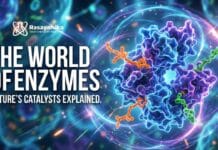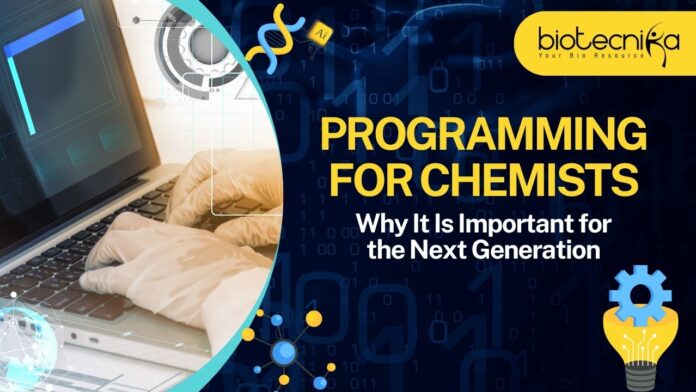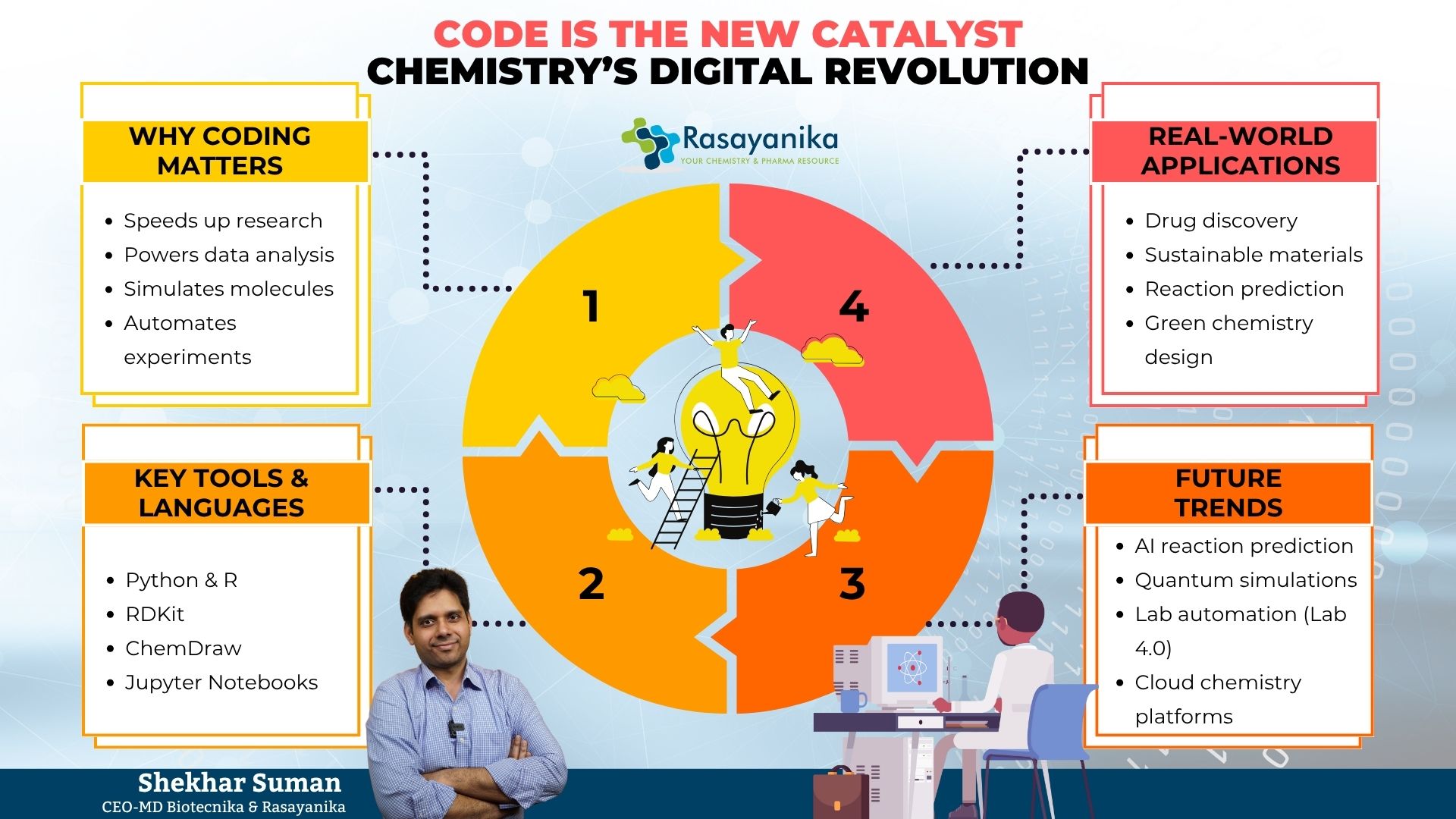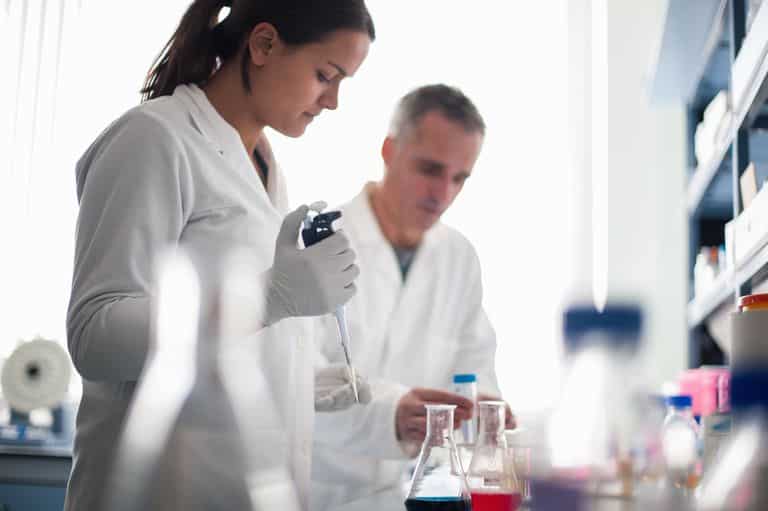Programming for Chemists: Why It Is Important for the Next Generation?
When you think about a Chemist, what visual comes to your mind?
Is it someone who’s working in a Chemical laboratory with Chemicals, test tubes, and beakers? This conventional visual is evolving rapidly in today’s world. Artificial Intelligence, data, Digital tools, and Machine Learning are driving Scientific progress and Technological Advancements. Chemistry is growing from its conventional shell of physical experimentation and Chemicals into a new age of Technology. Programming is becoming an essential part of a Chemist’s skill set, highly valued and sought after.
Chemical Research & Development (R&D) is becoming increasingly dependent on Data processing, data interpretation, and data collection. The Chemical and Analytical instrumentation utilized in laboratories generates enormous amounts of data. These datasets essentially require Programming and advanced knowledge to analyze efficiently as well as effectively.
For the next generation of Chemists, learning to Code is key to staying impactful, competitive, and innovative. Programming for Chemists enhances precision, increases productivity, and improves problem-solving. This makes it one of the essential advanced tools in a modern Chemist’s workplace or laboratory.
To better understand this Chemist and Technology revolution, let’s explore how Programming is reshaping the future of chemistry across various domains.
01 The Digital Chemistry
Chemistry is transitioning to a data-driven period. Modern instruments like Chromatographs, high-throughput screening systems, as well as spectrometers generate voluminous and complex data. Manual analysis is prone to error as well as is time-consuming. That’s where programming language steps in the world of chemistry. The main reasons for this transformation include:
- Advancements in AI & ML: Machine Learning algorithms require logical workflows and structured data, which is achievable with a Programming language.
- Enhanced Accuracy & Speed: Faster and more accurate decision-making is essential in Industry, organizations as well as Academia.
- Data explosion: High-throughput tools as well as techniques are producing a huge volume of experimental results.
By learning Programming, Chemists can organize, analyze, as well as clean Datasets better. This would lead to faster innovations.
02 Chemistry Meets Code
Chemists are now trained to think logically and solve problems methodically. Programming extends those skills into the digital space.
Why should chemists learn to code?
- It allows them to automate routine laboratory tasks.
- They can build scripts to analyze results in real time.
- They can visualize datasets in novel ways, helping uncover trends that are otherwise difficult to spot.
Programming helps chemists move from data collection to data insight. It makes the workflow smooth as well as research more reproducible. With even a basic level of coding, chemists can solve real-world problems rapidly with greater accuracy.
03 Applications of Programming in the Chemistry Sector
Advancements in Research Technology have a significant impact that is evident across various chemistry-related fields. From Environmental Science to Drug Discovery, Programming for Chemists is one of the driving forces behind Chemistry Research and Discoveries.
- Materials Science
-
-
- Simulation Software: Tools such as VASP and LAMMPS affect material behavior under various Chemical conditions.
- AI-Powered Design: AI and ML models help design advanced materials with custom properties for batteries, textiles, as well as electronics.
-
- Drug Discovery
-
-
- Virtual Screening: Platforms such as PyRx and AutoDock speed up the identification of lead compounds.
- Predictive Modeling: Machine learning models forecast molecular interactions, toxicity, and pharmacokinetics.
- Cheminformatics: Libraries such as RDKit help us to analyze molecular structure and chemical reactions.
-
- Analytical Chemistry
-
-
- Automation Scripts: Scripts written in a programming language such as Python or R can process spectroscopy data (e.g., NMR, IR, MS)
- Signal Processing: Baseline correction, peak detection, as well as noise reduction are optimized using a programming language.
-
- Environmental Chemistry
-
- Sensor Data Analysis: Real-time environmental data from air and water quality sensors is processed via code.
- Sustainability Tools: Models assess and minimize the environmental impact of Chemical processes.
- Climate Modeling: Simulations predict Chemical processes in ecosystems and atmospheric systems.
These real-world applications demonstrate that coding is not just an abstract skill; it has both immediate and practical benefits that can enhance the efficiency and impact of Chemical Research Industries.
04 Learning to Code: Where To Begin
Many chemists are intimidated by programming. However, starting anything is easier than it seems. A programming language is all about solving problems step by step, just like chemical reaction steps. Some platforms and tools are
- Jupyter Notebooks: For testing as well as writing code interactively.
- Python: It has vast libraries for Science and has an easy syntax.
- MATLAB (MATrix LABoratory): Popular in Research institutions for molecular modeling and simulations.
- R: Ideal for professionals working on Bioinformatics and Statistics.
Programming for Chemists becomes more engaging when applied to real-world problems, such as automating calculations or analyzing laboratory data. Chemists should stay motivated and begin utilizing Programming in Chemical processes.
By staying consistent and starting small, Chemists can eventually integrate Programming into their Chemical processes and Techniques.
05 Interdisciplinary Collaboration
Chemists often work with professionals from various industries, including Biologists, Physicists, Engineers, and Computer Scientists, thereby collaborating and innovating.
Why this matters:
- Cross-disciplinary skills open up new horizons for funding and innovations.
- Chemists can contribute to the Development of Software Tools used in Research.
- Having a shared and common Technical language improves teamwork and partnerships.
Having Coding knowledge would give an added benefit to Chemists, and they can have a prime role in interdisciplinary projects. In such collaborative ecosystems, Programming for Chemists becomes a bridge between domain knowledge and technical implementation, this improves reach as well as quality of the Research.
06 The Career Opportunities
A Chemist equipped with coding skills is highly desirable in the industry. Programming for Chemists aids in Research for Data Modeling, Automation, as well as Analyzes. It helps Chemists work with advancements in Robotics, Chemical Informatics, and software-powered laboratories. The demand for Computational Chemists is skyrocketing in sectors such as Material Sciences, Pharmaceuticals, Academia, or environmental research. Some emerging roles are:
- Cheminformatics Specialist – Manages, analyzes, and develops Chemical databases.
- Computational Chemist – Uses Software tools to predict and model molecular behavior and reactions.
- Sustainability Analyst: Utilizes simulations to reduce waste and improve Chemical processes for an eco-friendly future.
- AI Researcher – Develops models and algorithms to understand Chemical reactions and behaviours.
- Digital R&D (Research & Development) Scientist: Integrates data pipelines and management, as well as automation in the laboratory.
These career roles are not just limited to research laboratories; they also include roles in startups, tech companies, and environmental agencies.
07 Chemists’ Future Perspective
Chemistry’s future is connected, intelligent, as well as automated. Smart and innovative laboratories are emerging that are driven by AI, Sensors, and Robotics. These automated laboratories enable real-time data analysis, predictive maintenance of instruments, as well as remote Chemical experiments. With ML algorithms interpreting vast amounts of Chemical data, Programming for Chemists can simulate Chemical reactions with greater accuracy, accelerate discovery timelines, as well as design Chemical molecules rapidly.
Future trends include:
- Cloud-based Laboratories aid scientists in collaborating and remotely running Chemical experiments.
- AI-Assisted Innovations automate both hypothesis testing and generation.
- Open-source Science promotes collaboration and transparency through shared codebases.
- Sustainable Discoveries to optimize resource use, using modeling to minimize wastage and promote sustainable development.
The Chemical world is changing rapidly, no longer restricted to laboratory benches and glassware. Chemists with knowledge of Programming utilize codes to analyze datasets, design solutions, and simulate reactions with ease and great accuracy.
An impactful Chemist of the future should be proficient in the language of molecules as well as Machines. From automating Research to analyzing data, Programming opens up new horizons in the Chemistry sector as well as other connected industries.
Learning to Program doesn’t mean giving up traditional laboratory skillsets. It means enhancing and advancing them. With Programming for Chemists, professionals can turn complex data into clear insights, create tools, as well as automate tedious tasks that expand what’s scientifically possible.
They will be the Scientists closing the gap between Science and Technology. Moreover, we can envision Chemistry’s future as more sustainable, highly innovative, as well as faster.
The Chemists having the power to code could be the professionals shaping the future’s innovations. Be that futuristic Chemist, because the future needs you.
















































